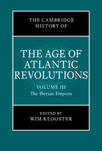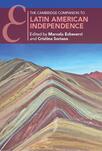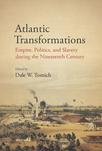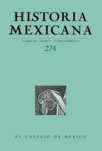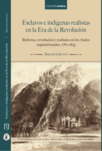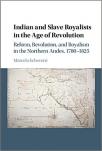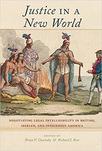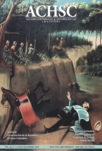Marcela Echeverri Muñoz
Associate Professor
Office:
HQ 239
Phone:
203-432-6218
Fields of interest:
History of social sciences, gender and nationalism; political theory and state formation; Spanish empire and Atlantic world; Revolutionary Age, race and ethnicity; slavery and abolition; twentieth-century Latin American social thought
Bio:
Marcela Echeverri is an interdisciplinary scholar with a background in Anthropology and Political Theory. She received her PhD in Latin American and Caribbean History from New York University (NYU) in 2008, and taught at the City University of New York (CUNY) before joining Yale in 2013. She has written about Anthropology, gender, and nationalism in mid-twentieth century Colombia; slavery and the law in the Spanish empire; and the history of Indian and black royalists in Latin America’s independence wars. Her research and teaching interests focus on the relationship between political subjectivities and social transformation in Latin America from colonial times to the present.
Echeverri is currently at work on a book-length research project that seeks to recast Gran Colombian slavery and anti-slavery between 1820 and 1860 in the hemispheric dimensions of its time. This study will show that, rather than seeing mainland Spanish America as peripheral to the history of Atlantic slavery and anti-slavery, historians should consider the region as the epicenter of larger historical dynamics that shaped the meaning of freedom in the American continent.
She has co-edited two journal special issues that grow out of this current project, starting a debate about new interpretations on Gran Colombian history and in the field of Spanish American abolition. The first is “La invención de la república: la Gran Colombia,” with Francisco Ortega (Universidad Nacional de Colombia, Bogotá) and Tomás Straka (Universidad Católica Andrés Bello, Caracas, Venezuela) in Anuario Colombiano de Historia Social y de la Cultura (Journal of Universidad Nacional de Colombia, Bogotá) 45, no. 2 (2018). The second, “Los ecos atlánticos de las aboliciones hispanoamericanas,” with Celso Castilho (Vanderbilt University), appeared in Historia Mexicana 69, no. 2 (2019), published out of El Colegio de México.
At Yale, Professor Echeverri was the co-coordinator of the Race and Slavery in the Atlantic World Working Group in 2017-2019 and the Early Modern Empires Workshop in 2018-2019.
A MacMillan Research Fellow at Yale, Echeverri was an Alexander von Humboldt Foundation research fellow in Germany, affiliated with the Center for Global History and the Institute for Latin American Studies at the Freie Universität in Berlin (2019-2023). She was part of the 2015-2018 Leverhulme Network “War and Nation in South America.” She has won fellowships from the Instituto Colombiano de Antropología e Historia (Bogotá, Colombia); the Consejo Superior de Investigaciones Científicas and Fundación Mapfre (Madrid, Spain); the John Carter Brown Library; and NYU’s Humanities Initiative. She also received research grants from Harvard’s Atlantic History Seminar, CUNY’s Research Foundation, and the Dean of Humanities at the College of Staten Island/CUNY. She was an associate fellow in fall 2008 at Rutger’s Center for Historical Analysis; a participant in Johns Hopkins University’s Center for Africana Studies 2009 National Endowment for the Humanities Summer Institute; a postdoctoral fellow at University of Maryland’s Latin American Studies Center in fall 2009; and a Mellon Residential fellow at the Center for the Humanities in CUNY’s Graduate Center during 2011-2012.
Selected Publications
Marcela Echeverri and Cristina Soriano (eds.), The Cambridge Companion to Latin American Independence. New York: Cambridge University Press, 2023.
“Royalists, Monarchy, and Political Transformation in the Spanish Atlantic World during the Age of Revolutions.” In The Cambridge History of the Age of Atlantic Revolutions, Volume 3: The Iberian Empires. Edited by Wim Klooster. New York: Cambridge University Press, 2023, pp. 277-303.
“Antislavery and Abolition in the Spanish American Mainland.” In Oxford Research Encyclopedia of Latin American History. Oxford University Press, 2014. Article published September 20, 2023.
“Slave Exports and the Politics of Slave Punishment during Colombia’s Abolition Process (1820s-40s).” Journal of Global Slavery 7 (2022), pp. 73-102. Special Issue “Punishing the Enslaved: Slavery, Labor, and Punitive Practices in the Americas, 1760s–1880s,” edited by Christian De Vito and Viola Müller.
“Slavery in Mainland Spanish America in the Age of the Second Slavery.” In Atlantic Transformations: Empire, Politics, and Slavery during the Nineteenth Century. Edited by Dale Tomich. Albany: Fernand Braudel Series, SUNY Press, 2020, pp. 19-44.
“Esclavitud y tráfico de esclavos en el Pacífico suramericano durante la era de la abolición.” Historia Mexicana (Journal of El Colegio de México, Mexico City) 69, no. 2 (2019), pp. 627-691.
“Monarchy, Empire, and Popular Politics in the Atlantic Age of Revolutions.” Presentation to the “Popular Royalism” dossier edited by Hendrik Kraay in Varia Historia 35, no. 67 (2019), pp. 15-35.
Esclavos e indígenas realistas en la era de la revolución. Reforma, revolución y realismo en los Andes del norte, 1780–1825. Translation by Silvia Rivera Cusicanqui. Bogotá: Universidad de los Andes / Banco de la República de Colombia, 2018.
Indian and Slave Royalists in the Age of Revolution: Reform, Revolution, and Royalism in the Northern Andes, 1780–1825. New York: Cambridge University Press, 2016.
-
Winner of the Michael Jiménez Prize
-
Bolton-Johnson Prize Honorable Mention
-
Yale University Heyman Prize for Outstanding Scholarly Publication
“‘Sovereignty has Lost its Rights’: Liberal Experiments and Indigenous Citizenship in New Granada, 1810–1819.” In Justice in a New World: Negotiating Legal Intelligibility in British, Iberian, and Indigenous America. Edited by Brian Owensby and Richard Ross. New York: New York University Press, 2018, pp. 238-69.
“Debate: La crisis imperial como una experiencia compleja, 1808–1825.” Marcela Echeverri, Marta Lorente, Rodrigo Moreno, and Clément Thibaud. Ayer 108, no. 4 (2017), pp. 307-337.
“Independence and Revolution in Latin America.” In Understanding & Teaching the Age of Revolutions. Edited by Ben Marsh and Michael Rapport. Madison: University of Wisconsin Press, 2017, pp. 262-279.
“Race, Citizenship, and the Cádiz Constitution in Popayán (New Granada).” In The Rise of Constitutional Government in the Iberian Atlantic World: The Impact of the Cádiz Constitution of 1812. Edited by Scott Eastman and Natalia Sobrevilla Perea. Tuscaloosa: University of Alabama Press, 2015, pp. 91-110.
“Abascal, Cádiz y el realismo popular en Popayán.” In Abascal y la contra -independencia de América del Sur. Edited by Georges Lomné and Scarlett O’Phelan. Lima: Institut Français d’Études Andines (IFEA) and Pontificia Universidad Católica del Perú, 2013, pp. 449-467.
“Agustín Agualongo and the Royalist Cause in the Wars of Independence.” In The Human Tradition in Colonial Latin America, Second Edition. Edited by Kenneth J. Andrien. Rowman and Littlefield Publishers Inc., 2013, pp. 289-304.
“Popular Royalists, Empire, and Politics in Southwestern New Granada, 1809-1819.” Hispanic American Historical Review 91, no. 2 (2011), pp. 237-269.
-
Winner of the James Alexander Robertson Prize
“‘Enraged to the Limit of Despair’: Infanticide and Slave Judicial Strategies in Barbacoas, 1789-1798.” Slavery & Abolition 30, no. 3 (2009), pp. 403-426.
“Los derechos de indios y esclavos realistas y la transformación política en Popayán, Nueva Granada (1808-1820).” Revista de Indias Vol. LXIX, No. 246 (2009), pp. 45-72.
“Antropólogas pioneras y nacionalismo liberal en Colombia, 1941-1949.” Revista Colombiana de Antropología 43 (2007), pp. 61-90.
“Conflicto y hegemonía en el suroccidente de la Nueva Granada, 1780-1800.” Fronteras de la Historia 11 (2006), pp. 343-76.
“Nacionalismo y arqueología: la construcción del pasado indígena en Colombia (1939-1948).” In Arqueología al Desnudo. Reflexiones sobre la práctica disciplinaria, pp. 133-52. Edited by Cristóbal Gnecco and Emilio Piazzini. Popayán: Editorial Universidad del Cauca, 2003.
“Ciencia política, teoría política y la construcción de la idea de Democracia en Colombia, 1989-2001.” Colombia, Ciencia y Tecnología 19, no. 4 (2001), pp. 9-23.
“El Museo Arqueológico y Etnográfico de Colombia (1939-1948): Representando la nacionalidad a través de la construcción del pasado indígena.” Revista de Estudios Sociales 3 (1999), pp. 103-109.
“La fundación del Instituto Etnológico Nacional y la construcción genérica del rol de antropólogo.” Anuario Colombiano de Historia Social y de la Cultura 25 (1998), pp. 216-47.
“El proceso de profesionalización de la Antropología en Colombia. Un estudio de caso en torno a la difusión de las ciencias y su institucionalización.” Historia Crítica 15 (1997), pp. 67-79.
Degrees Received
Ph.D. Latin American and Caribbean History, New York University, 2008.
Master’s degree in the History of the Hispanic World, Fundación MAPFRE-Tavera and
Consejo Superior de Investigaciones Científicas (CSIC), Madrid, Spain, 2006.
Master’s degree in Social and Political Theory, The Graduate Faculty, The New School
for Social Research, 2001.
Bachelor’s of Arts Degree in Anthropology, Los Andes University, Bogotá, Colombia, 1997.
Period:
Early Modern
Modern
Geography:
Atlantic
Caribbean
Global/International
Latin America
Thematic:
Comparative
Cultural
Empires & Colonialism
Historiography
Indigenous Peoples
Intellectual
Legal
Political
Race & Ethnicity
Social
War & Society

